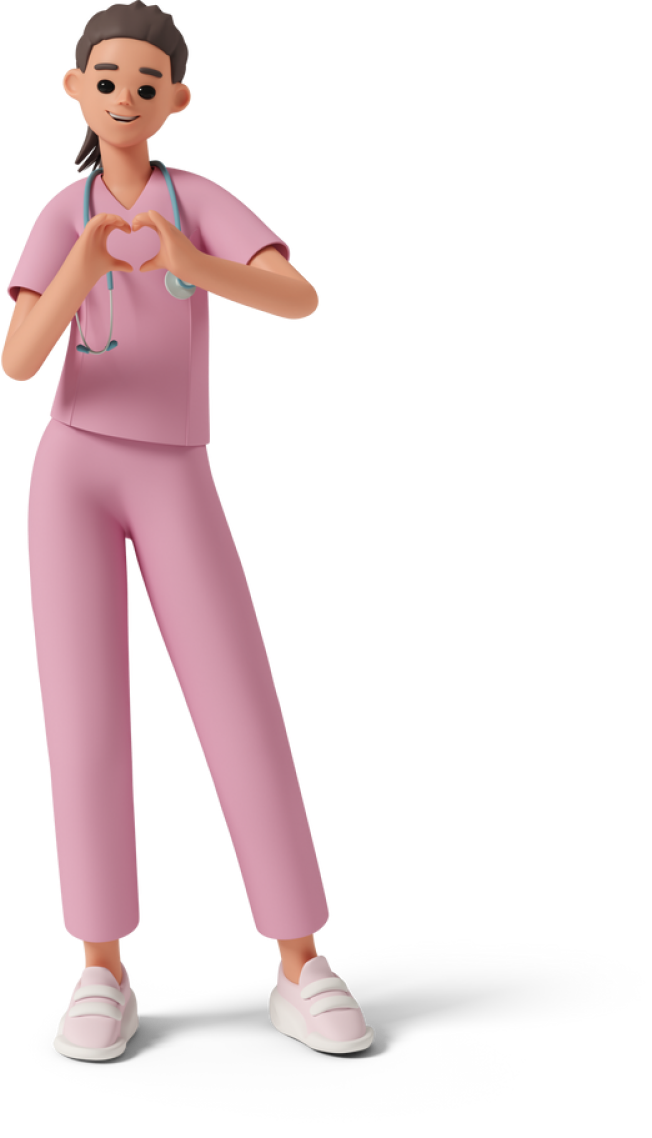
☝️ The most important facts in brief
- Training is a great challenge for prospective doctors. Studying medicine requires a great deal of commitment and stamina and takes up most of your day.
- As a doctor, you have a wide range of career opportunities: you can specialise in a field that suits your interests and have the opportunity to work in a hospital, in a private practice or in research.
- Doctors have a great responsibility towards their patients and can significantly influence the lives of the people concerned with their diagnoses and decisions. A corresponding sense of responsibility is therefore important if you want to enter this profession.
- To become a doctor, you have to study medicine for 6 years. If you cannot get a place in Germany due to the high numerus clausus, you have the option of studying abroad.
📖 Table of contents
Studying medicine gives you access to a varied and fulfilling profession. As a doctor, you bear responsibility and help your patients every day. However, the path to becoming a doctor is demanding. After graduating from high school, you will have to go through a learning-intensive medical degree programme and pass all intermediate examinations as well as the final state examination. This article offers a variety of tips and helps you decide whether being a doctor is the right career for you.
Are you interested in studying medicine?
We will be happy to advise you free of charge about your options for studying medicine, including advice on studying medicine in another EU country, which is fully recognised in Germany.
Good reasons for studying medicine
Becoming a doctor offers you many exciting opportunities and prospects. There is far more than just one reason to opt for a Medical study place and to take this often strenuous path.
We would now like to show you the clear reasons for studying medicine and working towards a licence to practise medicine.
Many interesting topics
Studying medicine involves a wide range of exciting topics. Each specialism provides new, exciting content and insights. You will get to know the body and its functions in detail and learn how to diagnose diseases with various examinations.
In principle, every lecture opens up new and interesting contexts for you, and you will also constantly learn new things in your later work as a doctor.
Best career prospects
As a doctor, you have excellent career opportunities both in Germany and worldwide. The ability to carry out expert diagnostics and treat illnesses makes you a sought-after specialist in hospitals and surgeries. You can also advance your career by completing specialist training and working as a senior physician or head physician, for example.
Good earning potential
If you are a fully qualified doctor, you will receive a good salary. As a junior doctor, you will initially earn around 5,000 euros gross. As you gain more professional experience and possibly specialise in a particular field, your salary will increase significantly. You can also earn an excellent salary as a registered doctor with your own practice.
Helping people
An important reason for studying medicine is the motivation to help people. As a doctor, you play a central role in the healthcare system and your commitment is essential for the well-being of patients. You alleviate pain and in many cases even save lives. Such meaningful work is the main reason why many school leavers decide to train as a doctor and hope to get one of the coveted places to study medicine.
Opportunity to go into research
Studying medicine not only enables you to work as a doctor in a clinic. You also have numerous opportunities to become active in research and contribute to the development of new methods for diagnosing and treating a wide range of ailments. The doctoral thesis is the first step in this direction. You do not need a doctorate to work as a junior doctor or later as a specialist. However, the title shows that you have already worked scientifically as part of your doctoral thesis and have gained experience in the basics of this.
Reasons not to study medicine
Studying medicine is not always a pleasant experience. It also brings with it many challenges. Here are some reasons that clearly speak against this degree programme:
- Long and strenuous training
- Very difficult examination after the likewise very strenuous practical year (PJ)
- Emotional stress due to confrontation with difficult human fates
- Little free time, as you have to study intensively for each individual subject
- As a doctor, you sometimes have to work nights and weekends
- High responsibility and serious consequences of errors
Only if you are aware of these reasons and are nevertheless certain that you absolutely must Study medicine this degree programme is also the right one for you.
The medical profession
As a doctor, you have numerous opportunities to realise your professional potential. Whether in a clinic, your own practice or in research, the medical profession is multifaceted. Studying medicine prepares you for a variety of specialisms and employment opportunities and opens up the career paths described below.
Work in clinics
For most students, the first step after graduating from medical school is to work in a large hospital. There, they can work as a junior doctor in various specialisms such as internal medicine, medicine Surgery or the Oncology work. This working environment also offers excellent opportunities to gain experience and train as a specialist.
Doctor in a private practice
If you open your own medical practice, you will look after your patients there independently. As a rule, however, you must first complete a training programme to become a specialist. You have the choice of which area you would like to specialise in. In general medicine in particular, as a GP you have too many long-term patients Contact uswhich creates a corresponding relationship of trust.

Teaching and research
Not all doctors work exclusively as doctors. You also have the opportunity to teach students at university - usually after training as a specialist and working at a clinic. Research is another option for working as a doctor. Here you can make a valuable contribution to progress in medicine.
Doctors in other professions
Apart from the traditional medical profession, there are other opportunities to pursue a career after studying medicine. For example, the pharmaceutical industry and healthcare management are regularly looking for competent doctors. Doctors are also in demand as medical consultants or medical journalists.
Studying medicine - your path to becoming a doctor
To become a doctor, you have to study medicine for six years and graduate with the state examination. You can only specialise in a particular subject after completing this degree. We have summarised the most important information about studying medicine for you in the following sections.
Admission requirements
Studying medicine is an admission-restricted degree programme. There are far more applicants than places available. An excellent Abitur is therefore one of the best prerequisites for gaining a place.
However, completed vocational training, a good academic aptitude test and many other qualifications can also play a role, as 70 % of study places are awarded on the basis of criteria that are not solely based on A-level grades.
Studying abroad as an alternative
If you unfortunately don't get a place at a German university, you still have the opportunity to study medicine abroad. We will be happy to advise you on this and take care of the application to the best universities abroad for you.
Preclinical section
The medical degree programme begins with the pre-clinical section. Subjects such as chemistry, biology, anatomy, physiology and physics are taught here, in which you learn the basics of the human body and its functions. After two years, the first major intermediate examination takes place: the first state examination, also known as the "Physikum".
Clinical section
Once you have passed the examination for admission to the four-year clinical section of the medical degree programme with the first state examination, you can now continue with a much more practice-oriented approach. Subjects such as internal medicine, surgery, Dermatology, pathology, Urology and paediatrics provide you with an overview of the various activities of doctors in these fields.
Practical year (PJ)
During your PJ, you will usually work in hospital under the supervision of experienced specialists after the clinical section. Of these, 3 months must be spent in surgery, 3 months in internal medicine and 3 months in a speciality of your choice. Among other things, you will learn how to take a professional medical history and carry out various treatments.
State examination
After the practical year, the last major examination is the state examination. This is where you prove that you have the knowledge and skills to work as a doctor.
Further training to become a specialist
After your state examination, you are already a doctor and can take up a position at a clinic. Now you still have the opportunity to specialise in a specific subject, such as general medicine, neurology, psychiatry or psychotherapy. Cardiology to specialise. Further training usually takes 5-6 years, depending on the specialist training programme.
What salary can you expect as a doctor?
Working as a doctor is one of the best-paid professions. However, salaries vary greatly depending on speciality and experience. As a junior doctor, the starting salary in a clinic is usually around 5,000 euros gross. After completing further specialist training, it can easily be 6,000 to 8,000 euros. If you become a senior or head physician, the salary is usually negotiated freely and can be very high.
You can also earn a five-figure monthly salary in your own practice. However, you must bear in mind that you will also have to bear higher costs and corresponding risks.
Personal aptitude - you must have these qualities
Both medical studies and the medical profession require certain qualities. Without these, you will not be able to successfully complete your studies, cope with the demanding day-to-day work and treat patients in the best possible way.
The following section shows you which personal strengths you should have in order to become a successful doctor and be happy with your career choice.
Stamina
It's not just the six-year duration of a medical degree programme that is a challenge. The degree programme is also very demanding. In some phases, you have to learn a lot at once, which means that your free time is limited during this time.
Only if you really have the determination to become a doctor will you be able to keep up the fast pace of learning and the associated sacrifices in the long term.
Empathy
There are not only nice situations in a doctor's job. Patients have many worries and sometimes you will have to give them bad news. Empathy is therefore one of the essential requirements for a doctor. Even students have to learn to put themselves in the shoes of the patients they are treating and respond to them in an empathetic yet objective manner during bedside teaching.
Load capacity
Medical students and doctors are regularly exposed to a high level of stress. A long working day, night shifts and many emotionally difficult situations do not make it easy to keep a cool head. To be able to work efficiently, you therefore need to have strong nerves and not shy away from strenuous tasks.
High motivation
To achieve your goal of becoming a doctor, you need a strong will. Even with difficult tasks and a sometimes stressful working day, you should always know what you really want. Only if you are truly passionate about your profession can you ultimately be a really good doctor.

Study medicine abroad with futuredoctor
Do you dream of studying medicine, but the chances of getting a place in your home country are slim? We can help you find a suitable study place abroad.
Advantages at a glance:
- EU-wide recognised qualifications
- Study in English or German
- > 95% Success rate
- > 1,000 study places allocated
From the selection of universities and support in the application process to orientation and finding accommodation - we are at your side.





